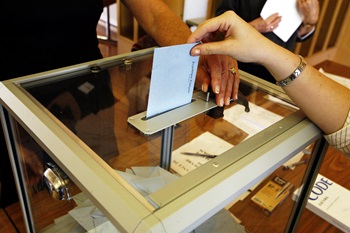By: Mike Green, Assistant of State Government Relations, Food Marketing Institute

On November 8, in addition to choosing the next President, voters in 35 states will consider a variety of ballot initiatives, referendums, or other measures. Over 150 total initiatives qualified to appear on state ballots this November.
Many of these initiatives will directly impact the food retail industry. To assist our members in navigating this flood of ballot activity, FMI has compiled the State 2016 Ballot Measure Guide for the Grocery Industry. The Guide highlights 37 measures in 15 states of particular importance to the food retail industry. For instance, voters in five states will be considering initiatives dealing with the minimum wage (AR, CO, ME, SD and WA). Two of these initiatives – in Arizona and Washington – contain a mandated paid leave requirement as well. Meanwhile, voters will consider 13 tax measures, from tobacco tax increases, to sales, income and corporate tax increases.
One of these tax increases – Oregon Measure 97 – is particularly concerning to our industry. If passed, the measure would be the largest tax increase in Oregon history. It would affect all C-corporations with Oregon sales in excess of $25 million. Specifically, the measure would subject these C-corps to a new minimum tax rate of $30,001, plus 2.5 percent of gross Oregon sales over $25 million annually. It is important to note that this is a tax on gross sales, not on profits, so businesses must pay the tax, whether or not they turned a small profit, a large profit or no profit at all. This is especially damaging to businesses with high sales and low profit margins, for example, grocery stores and startup businesses. A “no” vote is needed to defeat this onerous measure, and the Northwest Grocers Association is part of the coalition working to make sure this happens.
But grocers are not playing defense on every ballot measure. Indeed, some of these measures present opportunities. For example, next week Oklahoma residents will decide on State Question 792, which would allow grocery and convenience stores to sell wine and cold, regular strength beer. Residents of the state can currently only purchase 3.2 percent beer at room temperature from grocery and convenience stores. Modernizing outdated beer and wine laws is a crucial way for grocers to grow their business. A “yes” vote is needed to approve this necessary change. You can find more information about Initiative 792, in FMI’s Alcohol Toolkit and FMI’s State Alcohol Regulations Fact Sheet.
Over the next few months, FMI is beginning a series of Regional Legislative Meetings to breakdown the results of next week’s election and plan for the upcoming state legislative sessions in January. Download the State 2016 Ballot Measure Guide for the Grocery Industry and get more information on FMI State Affairs webpages as well as our Guide to the 2016 Election Guide.
Photo Credit: By Rama (Own work) via Wikimedia Commons

 Industry Topics address your specific area of expertise with resources, reports, events and more.
Industry Topics address your specific area of expertise with resources, reports, events and more.
 Our Research covers consumer behavior and retail operation benchmarks so you can make informed business decisions.
Our Research covers consumer behavior and retail operation benchmarks so you can make informed business decisions.
 Events and Education including online and in-person help you advance your food retail career.
Events and Education including online and in-person help you advance your food retail career.
 Food Safety training, resources and guidance that help you create a company food safety culture.
Food Safety training, resources and guidance that help you create a company food safety culture.
 Government Affairs work — federal and state — on the latest food industry policy, regulatory and legislative issues.
Government Affairs work — federal and state — on the latest food industry policy, regulatory and legislative issues.
 Get Involved. From industry awards to newsletters and committees, these resources help you take advantage of your membership.
Get Involved. From industry awards to newsletters and committees, these resources help you take advantage of your membership.
 Best practices, guidance documents, infographics, signage and more for the food industry on the COVID-19 pandemic.
Best practices, guidance documents, infographics, signage and more for the food industry on the COVID-19 pandemic.
